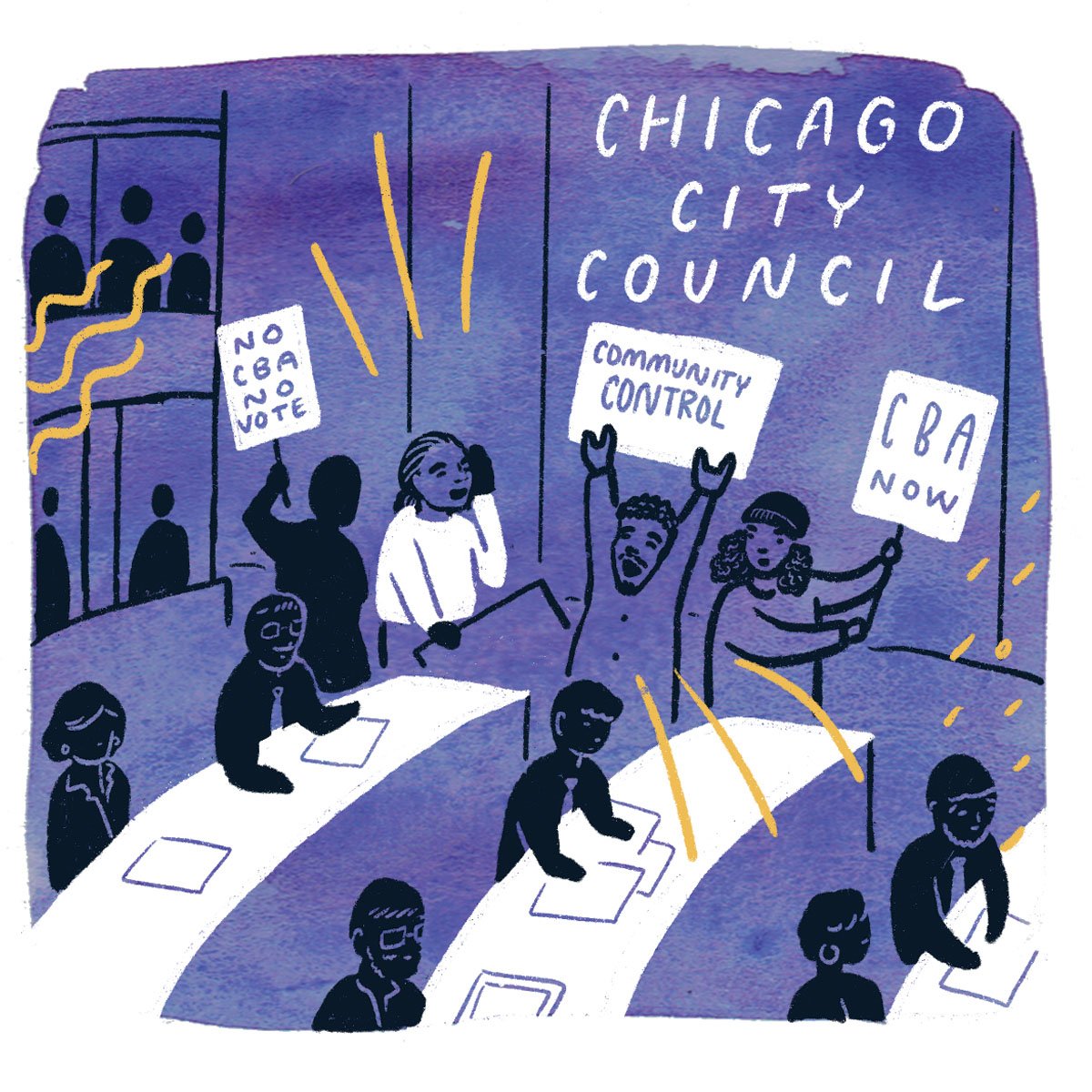Depending on how big or complicated the project is, these people and agencies need to approve the plans.
By Alma Campos, Sarah Conway and Phoebe Mogharei, City Bureau
Politicians and civil servants, in City Hall and beyond, will review development plans before they are approved. (Photo: Maria Cardona/City Bureau)
This article is part of Will That New Development Benefit Your Community? The People’s Guide to Community Benefits Agreements and Alternatives.
These people and groups approve or oversee different parts of the development process, depending on the specifics of each project. Residents can contact these public officials to get more information and to voice their support or opposition to developments, and they can attend public meetings to share their views on the project during public comment.
The City Council member(s) who represent the ward(s) where the project is proposed — sometimes called aldermen or alderpeople, in this zine we will refer to them as alders. In committees and during a full City Council vote, alders often take their guidance from and vote with the alder of the ward on a development project; this is called aldermanic privilege.
City Council — is the legislative branch of the city of Chicago, consisting of alders elected from each of the city’s 50 wards. A full City Council vote is the final approval needed for development that are particularly large or complex, require zoning changes, are in special designated zones or otherwise trigger additional requirements.
City Council’s Committee on Zoning, Landmarks and Building Standards — oversees all zoning legislation. Members vote on land use, zoning changes, building code ordinances and the designation, maintenance and preservation of landmarks after receiving recommendations from other departments and commissions.
Chicago Department of Planning and Development (DPD) — is the principal planning and development agency for the city of Chicago. The department oversees the city’s zoning and land-use policies, business and real estate development and housing, through entities including the following five key groups.
Chicago Plan Commission — reviews planned development proposals to make sure they are in line with the city’s urban planning laws and best practices. This may include Planned Developments (PDs), Master Planned Developments (Master PDs), the Lakefront Protection Ordinance, Planned Manufacturing Districts, Industrial Corridors and Tax Increment Financing (TIF) districts. Its activities largely involve zoning and its recommendations typically go to the City Council’s Committee on Zoning, Landmarks and Building Standards.
Chicago Community Development Commission — reviews and makes recommendations on the use of TIF to fund private redevelopment projects, the designation of new TIF districts and Redevelopment Areas and the sale of city-owned property located in TIF districts and Redevelopment Areas.
Committee on Design — a volunteer group of 24 architects and urban design professionals that advise DPD officials on urban design best practices for high-profile development projects and initiatives each month.
Chicago Zoning Board of Appeals — reviews land use issues that pertain to the Chicago Zoning Ordinance, such as proposed variations from the zoning code, special uses that require review to determine compatibility with adjacent properties and appeals of decisions made by the Zoning Administrator. Their decisions are final and do not go to City Council for approval.
Commission on Chicago Landmarks — recommends buildings, structures, sites and districts for legal protection as official Chicago landmarks. It also reviews alterations to existing landmarks and districts and proposed demolitions. Developments that include historical or architecturally significant structures are reviewed here.
Department of Buildings — reviews building permit applications, scrutinizing the building plans to make sure they are safe and in accordance with municipal code. However, the public doesn’t have a say in this. It is done internally by experts at the Department of Buildings.
Illinois Environmental Protection Agency (IEPA) — sets standards for industrial developments, monitors pollution and reviews permits of developments considered potentially toxic in Illinois.
Will That New Development Benefit Your Community? The People’s Guide to Community Benefits Agreements and Alternatives informs, engages and equips Chicago residents to be active participants in the development process. Want to share this zine with your neighbors? You can order print copies in English and Spanish here.
Support City Bureau’s community-centered reporting by becoming a City Bureau sustaining donor today.
To get twice-monthly emails including Chicago news and events, sign up for City Bureau’s Chicago newsletter.


